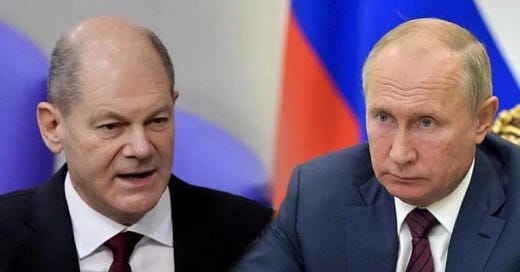"We don't want war in Europe" says Putin in joint press conference with Olaf Scholz
"It is our absolute duty as heads of government that Europe does not see an escalation into war," Scholz said.
Olaf Scholz made his inaugural visit as German chancellor to Moscow on 15th February 21’ to meet with Russian President Vladimir Putin, with the ongoing Russian-Ukrainian border crisis dominating the agenda.
Scholz arrived in Moscow on 14th February 21’ after a visit to Kiev, where he met with Ukrainian President Volodymyr Zelensky to boost Berlin's support for facing a Russian offensive.
"The most important thing is that we manage the relations between the countries through good discussions with each other," Scholz said during his meeting with Putin, adding that he was happy that the two leaders were able to meet face-to-face.
In a joint press conference after the meeting, the chancellor said he hoped that "blockages" in negotiations would be resolved with more high-level discussions in the near future.
"It is our absolute duty as heads of government that Europe does not see an escalation in war," Scholz said.
"We are ready to work together going forward. We are ready to go down the path of dialogue," Putin said at the press conference.
Putin said Germany is "one of Russia's most important partners" and added that he wants to cooperate further with Berlin. He emphasized the role of economic ties between the two, with Germany being Russia's second largest trading partner after China.

What did Olaf Scholz say about Ukraine?
Scholz said the troop gathering on Ukraine's border "could be seen as a threat." However, "we now hear that more troops are being withdrawn which is a positive sign and we expect more to come."
"For Europeans, it is clear that lasting security can be achieved not against Russia, but only with Russia," he told reporters.
The chancellor said that "violence on the borders ... should not be negotiated," referring to Ukraine.
"The negotiations cannot end in a crime, which will be a disaster for all," he said, adding that "it is important to go down the path of diplomacy to avoid war in Europe."
Putin says Russia doesn't want war
In response to a question about the possibility of war, Putin replied:"We don't want war in Europe."
The Russian president then referred to Scholz's earlier remarks that "people of this generation find it hard to imagine war in Europe."
“That is why we have put forward our proposal to start a process of discussion on equal protection for all” said Scholz.
On NATO, Putin said that "countries have the right to join military alliances as our allies in NATO always maintain, but it is also important that one's security is maintained and not at the cost of other countries' security."
"We are also ready to continue the discussion process," the Russian president said.
On economics, Putin said Germany is "one of Russia's most important partners" and added that it intends to cooperate further with Berlin. He emphasized the role of economic ties between the two, with Germany being Russia's second largest trading partner after China.
With reference to the Nord Stream 2 gas pipeline, he said "Let me be clear that we are willing to continue shipping gas through Ukraine beyond 2024."
A major issue among Western powers along Nord Stream 2 has been its position in bypassing Ukraine, which relies on gas revenues to be transported through the country.
Berlin's ambiguous relationship with Moscow
Germany has found itself in a difficult position with regard to the threat of a Russian invasion of Ukraine. It is both a member of NATO and an important trade partner for Russia.
Berlin has repeatedly vowed its support for Ukrainian sovereignty, but has been less keen on the dangers of abandoning the controversial Nord Stream 2 gas pipeline that would bring Russian fuel directly to Germany.
Germany has also been criticized for refusing to sell arms to Kiev as the region is an active conflict zone.
Conservative German MP Thomas Silberhorn told "Scholz's visit is a "last-minute attempt" to avoid war, but it is "up to Putin to send the signal for de-escalation now."
Regarding action for sanctions, Silberhorn warned that they would go "far beyond economic", with "the whole relationship between Russia and the West" at stake.
Asked about Germany's stance on Nord Stream 2, Silberhorn said, "Germany is ready to include the Nord Stream 2 pipeline in various Western sanctions," but as part of a broader sanctions package.
Deutsche Welle's fate in Russia
Scholz said he had also discussed with Putin the possibility of giving back its broadcast rights to Deutsche Welle in Russia.
The Kremlin recently banned Deutsche Welle's broadcast in Russia after the Russian state-backed channel RT had failed to secure a legal license for broadcasting in Germany.
Scholz said he hoped "Deutsche Welle will be able to continue its work in Russia." Also, Putin said that he is ready for further discussion on this matter.




You gathered information and explain nicely. Russia is threatening but would not go for war. Russia knowing that Mr. Baden will interfear immediately . Keep posting good information